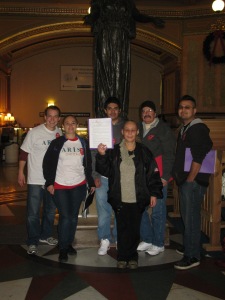Tina Cisarik has shared ministry at Siena House this year. Read on for her thoughts on Nativity!
The term “nativity”, which comes from the
Latin word natal (to be born), is not
unique to the birth of Jesus. In fact, it can be said that we each have been
part of our own nativity scene, whether in a tight manager, a well-stocked
hospital unit or a tempered pool of water on the living room floor. For the
past four months, I’ve been fortunate enough to be part of a constantly
transitioning nativity scene nestled in the Highbridge neighborhood of the
South Bronx.
Home to twenty-seven pregnant women and
women with young children, Siena House, a transitional shelter for homeless
women and infants, has embraced hundreds of mothers and babies since opening
her arms in 1990. Fueled with the passion of empowering marginalized women,
Siena provides resources and support for job readiness, permanent housing and
parenting skills, along with assuring a safe residential environment for both
mother and child. While the shelter has seen great change in the past
twenty-four years, a special event has withstood nearly two and a half decades:
The Annual Siena House Christmas Celebration.
 |
| Tina poses with a former resident of Siena House. |
Each year, staff and community members work
together to create a harmonious, memorable Christmas season for our residents,
including a visit from Santa Claus, baked goodies and a trimmed tree with gifts
underneath. As a self-proclaimed holiday elf, I’ve been navigating through the
heaps of paperwork, handmade ornaments and countdown chains with great joy,
resting assured that this season will bring much magic to those who partake.
However, the pile of clothing and toys that is beginning to accumulate in my
office has been the main focus of my attention. Made possible by the
contributions of neighboring parishes, Girl Scout troops and college students
at Fordham University, I’ve been sorting onesies and Tonka Trunks by the bunch.
Aside from stirring up my own nostalgia, I have found the sight of such
generosity to be inexplicable. There is something remarkable about individuals
traveling from near and far to bring forth gifts to children who may otherwise
go without.
Throughout this process, I’ve often paused
to ask myself where such generosity comes from. What ignites people to maintain
the idea that Christmas is the “season of giving”? What causes the heart to
want to lend of itself in the spirit of the holidays? Perhaps such generosity
stems from recognizing that the humble nativity scenes depicted in the Gospel
stories are not far off from our own. Perhaps it comes from understanding that,
had Mary been wandering around New York City looking for vacancy, Siena would
have given her a place to rest. Perhaps it comes from the fact that, like the
children of Siena House, Christ, too, came with an infant face.
It’s true: the Messiah was not birthed from
a swirl of wind and flakes of silver. There was no grand entrance, no royal
purple linens upon which to lie. This was not for the lack of God’s ability. This
was the same God who parted a traitorous sea, who dried the land after a flooding
and painted the sky with a rainbow of fellowship. But, God chose to become human in the womb of a young mother without a place
to rest. God chose to reveal the Sacred
Presence in the body of an infant swaddled in hay. God chose humility and poverty over regality and gleam. And yet this
child, wrapped in dusty cloth against his mother’s chest, immediately became a
figure of persistent compassion. Behold, the Child of God, Root of Jesse, Prince
of Peace. The titles are much more prestigious than the birthing scene depicted.
I’m continuously reminded of this as I
stare at the stack of stuffed animals waiting to be cuddled and pajamas waiting
to be worn. There was no telltale sign that the infant Jesus, helpless in
nature, would be the one to repurpose the Covenant of Love. And yet, people of
faith - guided only by a star - traveled
through the depths of evening and into unfamiliar territory to lay gifts upon the
baby’s feet. They invested in this new child with both affection and tokens of
appreciation, knowing all the while he’d be the one to give back. While these
offerings of frankincense, gold and myrrh were quite different from the Little
Tyke’s toys I’ve begun to wrap, the messages they provided remain the same: We accept
you, we honor you, we love you. You are our child, too.
 |
| A community member stitched together over 90 small teddy bears to be given to the babies during the Christmas celebration |
With Christmas around the corner, I ask of
each of you to embody the questions that Siena has so loving caused me to
ponder: How can you recall the origin of the holiday in every child you pass
and delight in those who retain a child-like spirit? How can you bring to life
the humility and generosity ever-present this season with both your words and
your actions? And mostly, how can you remember the oneness that you share with
the Messiah who, like all of us, started off quite small?
 |
| Tina handmade special ornaments for each of the Siena women and their children to be hung on their community Christmas tree. |
------------
The wolf will live with the lamb,
the leopard will lie down with the goat,
the calf and the lion and the yearling together;
and a little child will lead them.
Isaiah 11:6, NIV
the calf and the lion and the yearling together;
and a little child will lead them.
Isaiah 11:6, NIV










